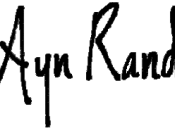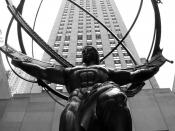The word "I"ÃÂ has the power to allow one to express his/her "I"ÃÂndividual perspective. Ayn Rand's Anthem allows the reader to envision a world without the word "I."ÃÂ She creates a backward collectivist society, working for a common goal.
The Individual cannot flourish in the world she depicts because it is a sin to set yourself apart from the group. The people in the collectivist society have been conditioned to feel badly towards expressing their individual qualities and talents.
Equality 7-2521 lives in this world. This story is of his revelation-- he realizes there is another side to the reality he has been confronted with throughout his whole entire life... a side he is able to break through to.
"We are nothing. Mankind is all. By the grace of our brothers are we allowed our lives. We exist through, by, and for our brothers who are the state, Amen"ÃÂ (Rand 21).
"We"ÃÂ was spoken instead of "I,"ÃÂ which suppressed individualism. This prayer reminds me of the "National Anthem"ÃÂ we recite as American kids in the public school systems.
This backward, non-technological, "pre-historic"ÃÂ type of society is very suffocating to the creative genius; all of your actions are controlled, and living conditions are fairly strict. One may be able to compare it to the collective society formed under the Communist regime in the former USSR. Equality 7-2521 decides to "divulge in sin"ÃÂ and make his own decision-- and what our hero doesn't realize is that he is longing for natural elements of the human being: freedom and individuality (and free will). He conducts his research during social time on an invention that brings him happiness. However, pursuing a hobby alone and working on solo projects were considered evil.
The free will of the hero surfaces and takes over as the story...


